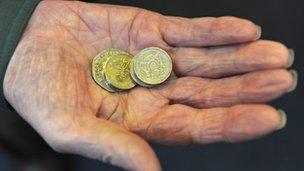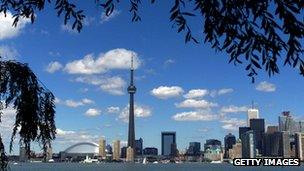'Frozen pension' victims abroad urge action
- Published

Some pensioners abroad receive just a few pounds a week from the UK government
British expatriates whose state pensions never go up say they want Britain suspended from the Commonwealth for discriminating against them.
More than a million pensioners have retired abroad - often joining family who have emigrated or returning to the country of their birth.
Many receive the same state pension as their UK-based counterparts.
But others had their pension frozen at the date of retirement, meaning they receive as little as £6.75 a week.
More than half of UK pensioners retired abroad live in one of 50 countries, including Spain, France and the United States, in which they are entitled to receive the same state pension as UK residents - £110.15 per week.
But if they retire to other countries not on that list - including many Commonwealth members such as Canada, Pakistan and New Zealand - their pension will be frozen at the date of retirement.
A pensioner retiring in Detroit, Michigan, would see their pension rise each year. But just over the river in Windsor, Ontario, it would be frozen.
Some 550,000 British expatriates have retired in countries where UK state pensions are not increased in line with inflation.
Many of them are unaware when they leave the UK that in spite of paying equal contributions, they will receive far less than others in pension payouts.
A spokeswoman for the Department for Work and Pensions told the BBC that pensions were uprated in line with "reciprocal arrangements" which pensioners should check before retiring abroad.
Commonwealth action
Campaigners say this is a persistent violation of the British government's commitment in the Commonwealth charter to oppose discrimination and support equal political, social, economic and cultural rights.
Jim Tilley is the chair of the Australian arm of the International Consortium of British Pensioners, which co-ordinates protests over frozen pensions in Australia, Canada, South Africa. The organisation wants Britain suspended from the Commonwealth over the issue.

Pensioners in Canada have their pensions frozen, while those in the neighbouring United States do not
"We are investigating to see if the Commonwealth Ministerial Action Group, which includes the foreign ministers of Canada, Australia, Trinidad [and other Commonwealth countries], would review our contention that by not treating all expat pensioners without discrimination that Britain is in violation of core Commonwealth values of equality and fairness," she said.
Ninety-two-year-old Delycia Willmott worked for 40 years in the UK. She retired to live in Sydney, Australia in 1979.
She told BBC Radio 4's Today programme that no-one had informed her that her modest widow's pension of £17 a week would never rise.
Now, 34 years later, her pension is still £17 - approximately 29 Australian dollars per week.
"I had no idea this would happen at all. Nobody ever mentioned it but there were hundreds of pensioners out here suffering from that same situation," she said.
"I feel very guilty about this because the Australian government has to make up my pension to the Australian equivalent. I don't think there's ever been a lot of understanding about the situation - in Australia, South Africa, Canada - you name it."
One 102-year-old woman who retired in 1974 to South Africa receives just £6.75 a week.
Mixed picture
The difference in treatment between pensioners in different countries goes back to reforms of the state pension carried out by the post-war government of Clement Atlee, when money was scarce and far fewer pensioners retired abroad.
Bilateral treaties since then with countries such as the United States and Jamaica ensured that pensions there were increased in line with inflation.
British pensions also rise with inflation in European Union countries because of provisions requiring equal treatment for people moving between member states.
However, in other countries - notably India, Pakistan and other Commonwealth countries where thousands retire after working in the UK - there is no bilateral arrangement in place.
Countries where expat pensioners live spend substantial sums topping up frozen UK pensions that have been severely eroded by inflation.
Successive governments of every political stripe have resisted campaigners' calls to put all pensioners in the same position no matter where the pensioners have retired.
The cost of uprating all overseas pensions has been estimated at more than £600m a year.
The official response to campaigners has been that the government pays the pensions it is required to pay under existing legislation and reciprocal arrangements with other countries.